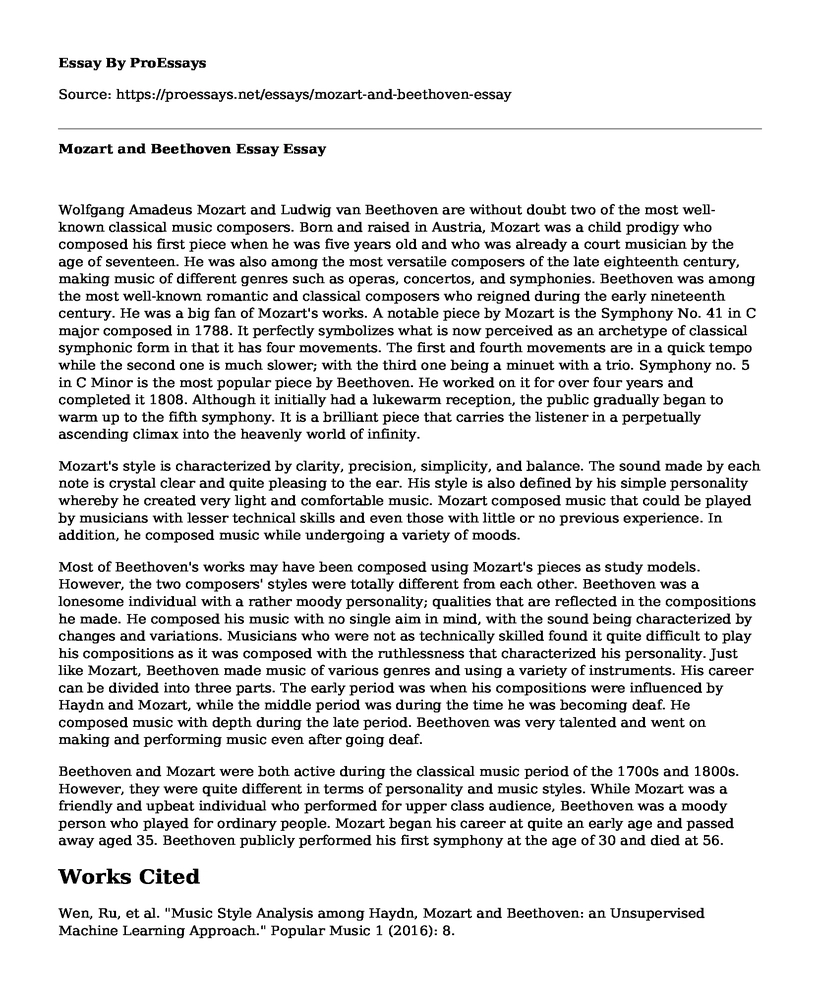Wolfgang Amadeus Mozart and Ludwig van Beethoven are without doubt two of the most well-known classical music composers. Born and raised in Austria, Mozart was a child prodigy who composed his first piece when he was five years old and who was already a court musician by the age of seventeen. He was also among the most versatile composers of the late eighteenth century, making music of different genres such as operas, concertos, and symphonies. Beethoven was among the most well-known romantic and classical composers who reigned during the early nineteenth century. He was a big fan of Mozart's works. A notable piece by Mozart is the Symphony No. 41 in C major composed in 1788. It perfectly symbolizes what is now perceived as an archetype of classical symphonic form in that it has four movements. The first and fourth movements are in a quick tempo while the second one is much slower; with the third one being a minuet with a trio. Symphony no. 5 in C Minor is the most popular piece by Beethoven. He worked on it for over four years and completed it 1808. Although it initially had a lukewarm reception, the public gradually began to warm up to the fifth symphony. It is a brilliant piece that carries the listener in a perpetually ascending climax into the heavenly world of infinity.
Mozart's style is characterized by clarity, precision, simplicity, and balance. The sound made by each note is crystal clear and quite pleasing to the ear. His style is also defined by his simple personality whereby he created very light and comfortable music. Mozart composed music that could be played by musicians with lesser technical skills and even those with little or no previous experience. In addition, he composed music while undergoing a variety of moods.
Most of Beethoven's works may have been composed using Mozart's pieces as study models. However, the two composers' styles were totally different from each other. Beethoven was a lonesome individual with a rather moody personality; qualities that are reflected in the compositions he made. He composed his music with no single aim in mind, with the sound being characterized by changes and variations. Musicians who were not as technically skilled found it quite difficult to play his compositions as it was composed with the ruthlessness that characterized his personality. Just like Mozart, Beethoven made music of various genres and using a variety of instruments. His career can be divided into three parts. The early period was when his compositions were influenced by Haydn and Mozart, while the middle period was during the time he was becoming deaf. He composed music with depth during the late period. Beethoven was very talented and went on making and performing music even after going deaf.
Beethoven and Mozart were both active during the classical music period of the 1700s and 1800s. However, they were quite different in terms of personality and music styles. While Mozart was a friendly and upbeat individual who performed for upper class audience, Beethoven was a moody person who played for ordinary people. Mozart began his career at quite an early age and passed away aged 35. Beethoven publicly performed his first symphony at the age of 30 and died at 56.
Works Cited
Wen, Ru, et al. "Music Style Analysis among Haydn, Mozart and Beethoven: an Unsupervised Machine Learning Approach." Popular Music 1 (2016): 8.
Cite this page
Mozart and Beethoven Essay. (2022, Jun 06). Retrieved from https://proessays.net/essays/mozart-and-beethoven-essay
If you are the original author of this essay and no longer wish to have it published on the ProEssays website, please click below to request its removal:
- Are Celebrities Entitled to a Private Life?
- Film Analysis Essay on Rocky
- The Literature of Salsa Dance Essay
- Movie Analysis Essay on Big Short
- Essay Example on Industrialization Spurs Expansion of U.S. Society
- Paper Example on Exploring the Roots: Native Americans, Colonies, and the Formation of the United States
- Essay on Colonial Strains: Native-American Relations, Slavery, and Modernity Perspectives







